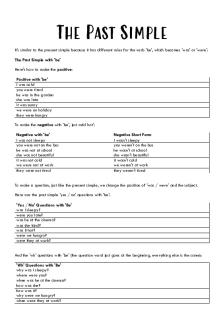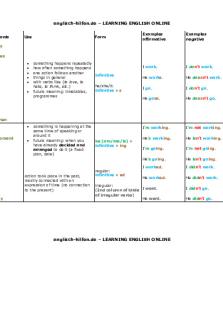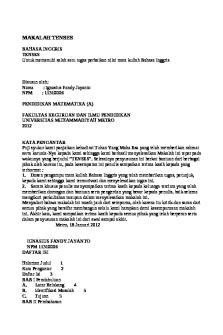Practicum - future tenses PDF

| Title | Practicum - future tenses |
|---|---|
| Course | Business English |
| Institution | Karel de Grote Hogeschool |
| Pages | 7 |
| File Size | 152.6 KB |
| File Type | |
| Total Downloads | 1 |
| Total Views | 143 |
Summary
Future tenses ...
Description
Exercise 1: future simple (will) – ‘going to’ – present continuous (be infinitive)– future perfect (will have worked) Complete the sentences by putting the verbs in brackets into the most appropriate form to refer to the future. Choose between the future simple, ‘going to’, present continuous or future perfect.
1. I am meeting/going to meet my colleagues tomorrow morning at nine. Not I will meet because there is actually a context (read between the lines). 2. I believe digital TV will replace (there is no doubt)/ is going to replace (prediction) cable in the future. 3. By the time (always future perfect) you finish work, I will have finished studying. 4. My bus is leaving at 8 am. Leaves is also possible but it’s not in the options. Will is not possible because you don’t want to emphasise the time. 5. On the 20th I am having dinner with a client. Going to have dinner it’s in your agenda, it’s not an intention. 6. You know what? I will stop by ( you are certain) tomorrow to talk about it then, because I really have to go now. Not going to, because it’ not an intention, it’s for sure. 7. Hurry up! By the time we arrive, the meeting will have started. 8. If you don’t study harder, you will fail the exam! The exclamation mark wasn’t there was a doubt that wouldn’t pass. But now it’s certain you will not pass. 9. The students are playing/are going to play against the teachers tonight. Preference = present continuous. 10. Do you think he is going/will go with us? - I hope so, because otherwise we will have to go all by ourselves and that won’t be so much fun.
Exercise2: present simple – future continuous – future perfect – was going to
The Human Resources Manager of a large company is explaining the appraisal (functioneringsgesprekken) system to a group of new employees. Complete his talk by putting the verbs in brackets into the right tense. Choose between present simple (I work), future continuous (I will be working), future perfect (I will have worked) and ‘was going to’. Look at the context!
“Your appraisal interviews are( than they are always in March)/will be ( now they are in March, next year they might be in April) in March. They were going to be in February but we had to postpone them. Sorry about that. Um, during February our line managers will be collecting all the information they need from you, and by the time you meet for the interview, they will have produced a checklist of points for discussion. (Right now we are before February!!!)
Right. In the interview you will be discussing your performance during the past year and any issue relating to your future needs, er ( it’s like ‘euh’), such as training. By the end of the meeting I hope that you and your line managers will have agreed on your personal objectives for next year, both in terms of sales targets and professional development. Is that clear?
OK, good. Of course there is some flexibility in the targets, in case anything happens to the market that we cannot predict. We may also have a budget for you to do some training, after you come back from your summer holidays but before work gets really busy in September. Is that OK? Yeah. Good. General truth Simple present After that, the next time that we all meet again will be in October, when I’d like some feedback on your training, as by then any courses that you do will have finished. Is that OK? Yeah. I will be sending you feedback forms nearer the time. Well, er, unless you have any questions, I think that’s all. Oh, no. Er, yes – I was going to have a word with you about your holiday plans, but you probably don’t know them yet. Could you email me with your request as soon as you know them?” (source: Emmerson P., Business Grammar Builder, MacMillan Education, 2006, p. 41)
Exercise 3: Fill in the correct tense (past, present or future). 1. Last night, Jenny was waiting for me at the door when I arrived. ‘(when’ in a sentence 1 SP and 1 past continuous)
2. - Oh, I’ve just realised. I don’t have any money on me. - Don’t worry, I will lend you some. 3. What were you doing at this time yesterday? - I was asleep. 4. Don’t call me this evening between 7 and 8. We will be having dinner then. 5. John has been reading for two hours (duration) and he has not done the dishes yet (PP or PPC). 6. I am afraid I will not be able to come to your party. Next Saturday evening, I will be playing/I am playing basketball from ten until midnight. 7. Lisa and John have made two films together so far. (why not ‘made’? Why ‘have made’? right now there are 2 film that exist that are made by the both of them.) 8. I have been reading that book you lent me, but I haven’t finished it yet. 9. Since she ………………………..…………………… (start) reading English magazines, her English ………………………..…………………… (improve). 10. ………………………..…………………… (you – go) out last night? No, I ………………………..…………………… (be) too tired. 11. I ………………………..…………………… (walk) along the street when I suddenly ……………………….. …………………… (hear) footsteps behind me. Somebody ………………………..…………………… (follow) me. I ………………………..…………………… (get) so scared that I ………………………..…………………… (begin) to run. 12. Ben is on holiday and he is spending his money very quickly. If he continues like this ………………………..…………………… (he – spend) all his money before the end of his trip. 13. How fast ………………………..…………………… (you – drive) when the accident ……………………….. …………………… (happen)? 14. We can meet at 10 p.m. By that time ………………………..…………………… (I – finish) my work. 15. When she ………………………..…………………… (try) to use her credit card, she realised that she ………………………..…………………… (already – spend) all her money. 16. ………………………..…………………… (you – ever – see) a chicken with four legs? When I ………………………..…………………… (be) three, we ………………………..…………………… (have) one at our school. 17. Ever since Charlotte and Emily ………………………..…………………… (become) friends they ………………………..…………………… (wear) the same clothes. 18. When ………………………..…………………… (Jack – last –buy) a suit? He ………………………..…………………… (not – buy) one for three years. 19. Susan ………………………..…………………… (feel) a lot better since she ………………………..…………………… (give up) smoking again. No wonder. At one time she ………………………..…………………… (smoke) about 20 cigarettes a day.
20. Thousands of Britons ………………………..…………………… (claim) that they ……………………….. …………………… (sleep) in a bed Dickens ………………………..…………………… (sleep) in.
Exercise 1: future simple – ‘going to’ – present continuous – future perfect Complete the sentences by putting the verbs in brackets into the most appropriate form to refer to the future. Choose between the future simple, ‘going to’, present continuous or future perfect.
1. I am meeting (meet) my colleagues tomorrow morning at nine. 2. I believe digital TV will replace (replace) cable in the future. 3. By the time you finish work, I will have finished (finish) studying. 4. My bus is leaving (leave) at 8 am. 5. On the 20th I am having (have) dinner with a client. 6. You know what? I’ll stop by (stop by) tomorrow to talk about it then, because I really have to go now. 7. Hurry up! By the time we arrive, the meeting will have started (start). 8. If you don’t study harder, you are going to fail (fail) the exam! 9. The students are playing (play) against the teachers tonight. 10. Do you think he will go (go) with us? - I hope so, because otherwise we will have to (have to) go all by ourselves and that won't be (not – be) so much fun.
Exercise 2: present simple – future continuous – future perfect – was going to
The Human Resources Manager of a large company is explaining the appraisal system to a group of new employees. Complete his talk by putting the verbs in brackets into the right tense. Choose between present simple (I work), future continuous (I will be working), future perfect (I will have worked) and ‘was going to’.
“Your appraisal interviews are (be) in March. They were going to be (be) in February but we had to postpone them. Sorry about that. Um, during February our line managers will be collecting (collect) all the information they need from you, and by the time you meet for the interview, they will have produced (produce) a checklist of points for discussion.
Right. In the interview you will be discussing (discuss) your performance during the past year and any issue relating to your future needs, er, such as training. By the end of the meeting I hope that you and your line managers will have agreed (agree) on your personal objectives for next year, both in terms of sales targets and professional development. Is that clear? OK, good. Of course there is some flexibility in the targets, in case anything happens (happen) to the market that we cannot predict. We may also have a budget for you to do some training, after you come (come) back from your summer holidays but before work gets (get) really busy in September. Is that OK? Yeah. Good. After that, the next time that we all meet (meet) again will be in October, when I’d like some feedback on your training, as by then any courses that you do will have finished (finish). Is that OK? Yeah. I will be sending (send) you feedback forms nearer the time. Well, er, unless you have (have) any questions, I think that’s all. Oh, no. Er, yes – I was going to have (have) a word with you about your holiday plans, but you probably don’t know them yet. Could you email me with your request as soon as you know them?” (source: Emmerson P., Business Grammar Builder, MacMillan Education, 2006, p. 41)
Exercise 3: Fill in the correct tense (past, present or future).
1. Last night, Jenny was waiting (wait) for me at the door when I arrived (arrive). 2. - Oh, I’ve just realised. I don’t have any money on me. - Don’t worry, I will lend (I – lend) you some. 3. What were you doing (you – do) at this time yesterday? - I was (be) asleep. 4. Don’t call me this evening between 7 and 8. We will be having (have) dinner then. 5. John has been reading (read) for two hours and he hasn’t done (not - do) the dishes yet. 6. I am afraid I will not be able to come to your party. Next Saturday evening, I am playing (I will be playing) (I – play) basketball from ten until midnight. 7. Lisa and John have made (make) two films together so far. 8. I have been reading (read) that book you lent me, but I haven’t finished (not – finish) it yet. 9. Since she started (start) reading English magazines, her English has improved (improve). 10. Did you go (you – go) out last night? No, I was (be) too tired.
11. I was walking (walk) along the street when I suddenly heard (hear) footsteps behind me. Somebody was following (follow) me. I got (get) so scared that I began (begin) to run. 12. Ben is on holiday and he is spending his money very quickly. If he continues like this he will have spen spentt (he – spend) all his money before the end of his trip. 13. How fast were you driving (you – drive) when the accident happened (happen)? 14. We can meet at 10 p.m. By that time I will have finished (I – finish) my work. 15. When she tried (try) to use her credit card, she realised that she had already spent (already – spend) all her money. 16. Have you ever seen (you – ever – see) a chicken with four legs? When I was (be) three, we had (have) one at our school. 17. Ever since Charlotte and Emily became (become) friends they have been wearing (wear) the same clothes. 18. When did Jack last buy (Jack – last –buy) a suit? He hasn't bought (not – buy) one for three years. 19. Susan has been ffeeling eeling (feel) a lot better since she gav ave e up (give up) smoking again. No wonder. At one time she smoked (smoke) about 20 cigarettes a day. 20. Thousands of Britons claim (claim) that they have slept (sleep) in a bed Dickens slept (sleep) in....
Similar Free PDFs

Practicum - future tenses
- 7 Pages

Narrative Tenses
- 8 Pages

Past tenses
- 2 Pages

Tenses Table
- 5 Pages

VERB TENSES
- 200 Pages

Perfect Tenses
- 2 Pages

makalah tenses
- 12 Pages

Wisselstromen practicum
- 11 Pages

Practicum - Strategiekaart
- 2 Pages

Practicum 5
- 4 Pages

Engels tenses herhalen
- 2 Pages
Popular Institutions
- Tinajero National High School - Annex
- Politeknik Caltex Riau
- Yokohama City University
- SGT University
- University of Al-Qadisiyah
- Divine Word College of Vigan
- Techniek College Rotterdam
- Universidade de Santiago
- Universiti Teknologi MARA Cawangan Johor Kampus Pasir Gudang
- Poltekkes Kemenkes Yogyakarta
- Baguio City National High School
- Colegio san marcos
- preparatoria uno
- Centro de Bachillerato Tecnológico Industrial y de Servicios No. 107
- Dalian Maritime University
- Quang Trung Secondary School
- Colegio Tecnológico en Informática
- Corporación Regional de Educación Superior
- Grupo CEDVA
- Dar Al Uloom University
- Centro de Estudios Preuniversitarios de la Universidad Nacional de Ingeniería
- 上智大学
- Aakash International School, Nuna Majara
- San Felipe Neri Catholic School
- Kang Chiao International School - New Taipei City
- Misamis Occidental National High School
- Institución Educativa Escuela Normal Juan Ladrilleros
- Kolehiyo ng Pantukan
- Batanes State College
- Instituto Continental
- Sekolah Menengah Kejuruan Kesehatan Kaltara (Tarakan)
- Colegio de La Inmaculada Concepcion - Cebu




